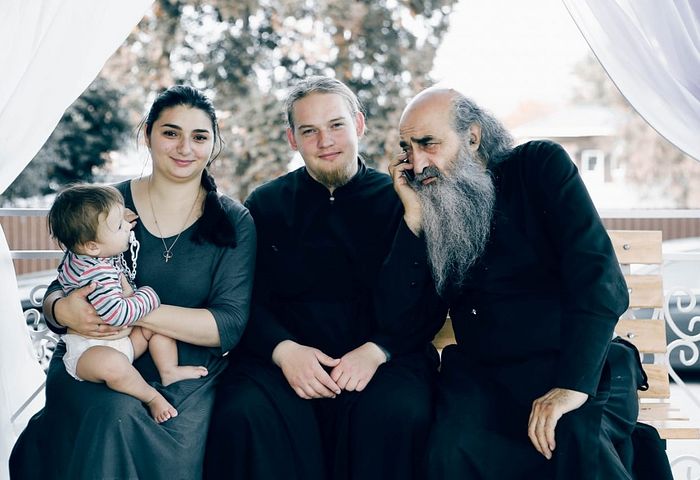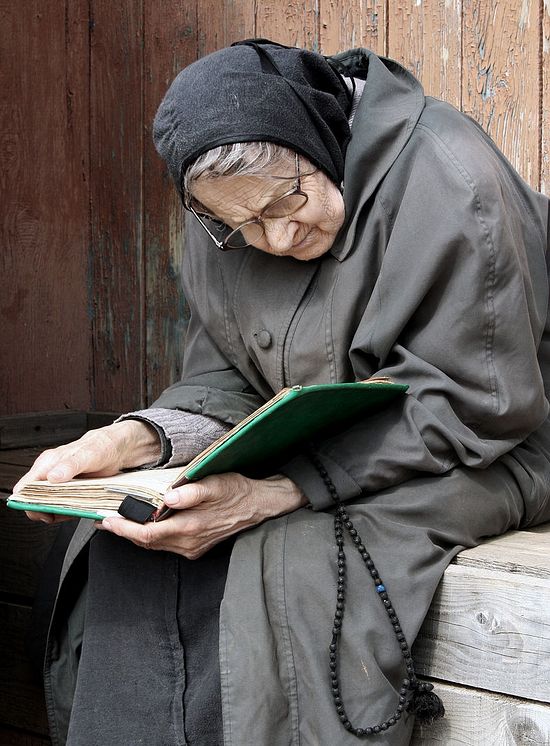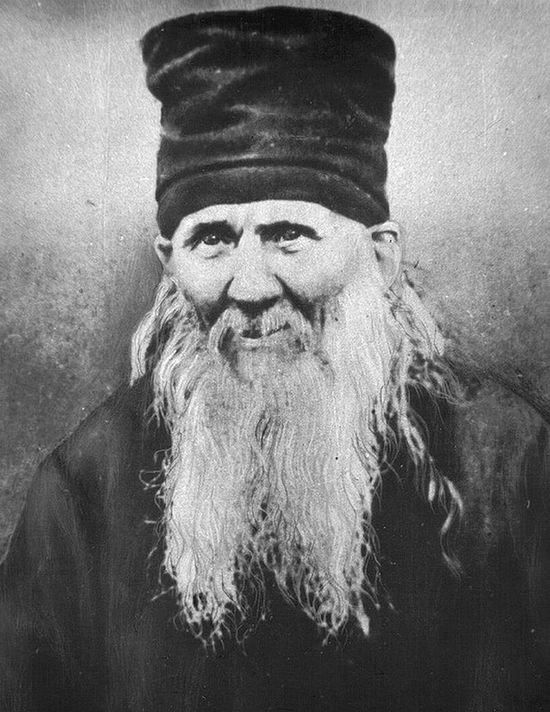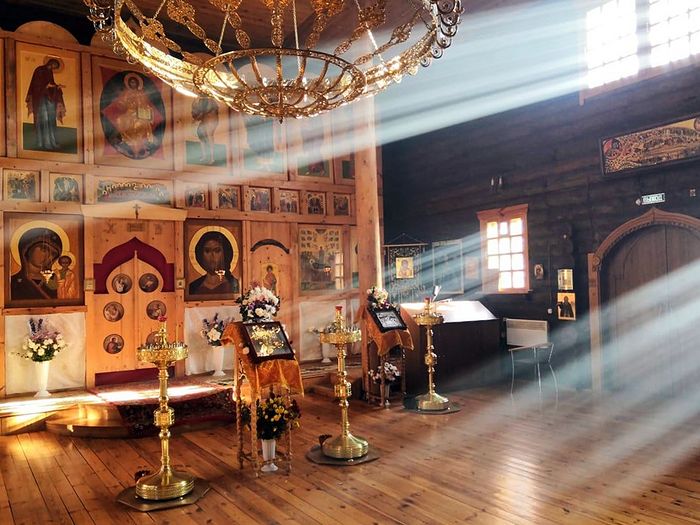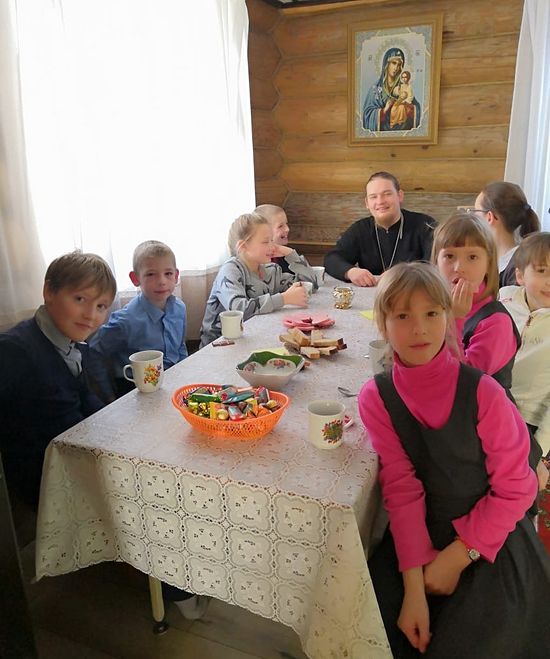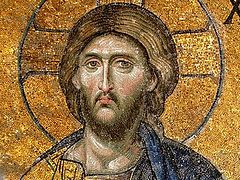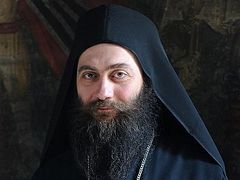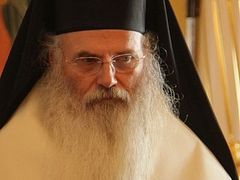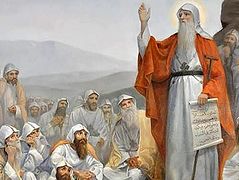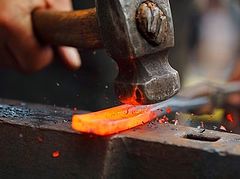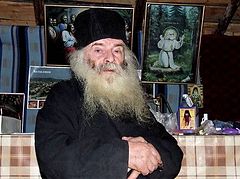Fr. Dimitry Torshin, the rector of the Church of the Dormition of the Most Holy Theotokos in the village of Ozersk (Podborki) in the Kaluga Province, tells amazing stories about the spiritual laws that operate unseen but authoritatively in our lives.
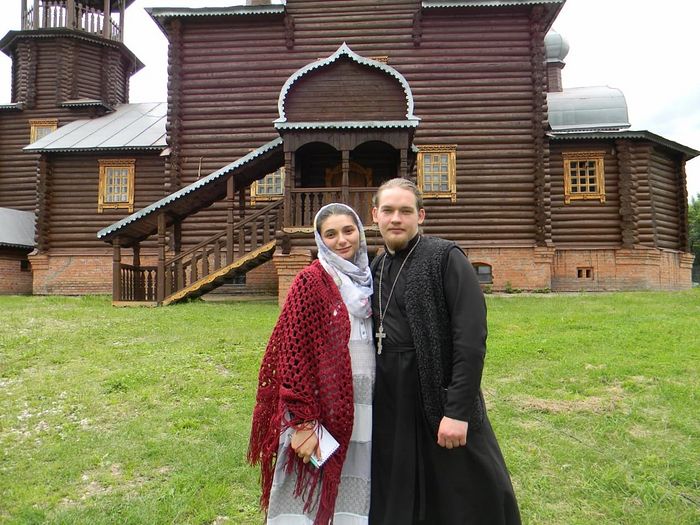 Fr. Dimitry with Matushka Sophia
Fr. Dimitry with Matushka Sophia
To be like Christ
When Matushka and I met, she, a young girl, was going to the provincial hospital in Annenki, to the orphaned babies, to care for them at least a little bit. These were babies born crippled, without arms or legs. Matushka would go, take them in her arms… It’s very hard to see such misfortune—it plunges you into despondency. They don’t even take such children in orphanages—their lives are suffering and torture for them.
I have a growing son—little Iliodor. He’s named in honor of my spiritual mentor—Hierodeacon Iliodor of Optina, by whose prayers he was born (the doctors had diagnosed “missed miscarriage” with all the ensuing consequences). Sometimes I look at my son and think: Glory to God that he was born healthy, he has arms and legs—he has become like us, his parents, to live an earthly life.
We have to become like Christ, to be able to live in the future life.
With the holy thou wilt be holy
If we don’t have anyone around us from whom we can learn spiritual growth, it will be difficult for us to grow spiritually. Therefore, it’s very important read the Patericon and seek spiritual beacons. For us, the lives of the saints are miracles, but they are a reality in which God is present.
And there are holy people now, in whose lives happen that which happened in the Patericon. I’ve had the chance to meet such people. They did seemingly miraculous things that for them were completely normal. We’ve just fallen from this reality a little bit.
My parents had four children of their own and three adopted children. One of my brothers had a serious speech defect in childhood. The doctor advised sending him to a speech boarding school where all the children had speech defects. He didn’t live there, he just went to lessons, and I, as his older brother, would take him and pick him up.
Within two weeks he had forgotten how to speak at all; he didn’t have to try—all the children around him spoke as poorly as he did. We, fortunately, quickly woke up and took our brother out of that school, transferred him to a normal school, and he started running around with the normal kids and soon started speaking beautifully.
I think this example can serve as an excellent illustration of the Psalter: With the holy thou wilt be holy; with an upright man thou wilt shew thyself upright; With the pure thou wilt shew thyself pure; and with the froward thou wilt shew thyself froward. (Ps. 17: 25–26).
How I wound up in Shamordino
In Shamordino, I met spiritual people of holy life. How did I wind up there? This is how it happened:
My parish is not far from the monastery—seven minutes by car. When I had just started serving, I encountered some great difficulties: Very few people came to church, and the cost of maintaining the church exceeded its income many times over.
Fr. Iliodor was, of course, aware of all my problems and decided to help me. Everyone knows he is the kindest person with a wonderful sense of humor. While I was there, he dialed the number of the abbess of the monastery in Shamordino, and she immediately asked: “What do you want, Fr. Iliodor?”
“Matushka, I have everything. Perhaps you need something? Perhaps some fish for dinner?”
(And the Patriarch was supposed to be arriving at the monastery just then.)
“That would be great… But what did you want, Fr. Iliodor?”
“No, I have everything! Maybe we can help you somehow? Do you need any fruit?”
“Yes, that would be great… But still, what did you want, Fr. Iliodor?”
“Come on, I have everything! I even have batiushkas!”
He knew that the batiushkas at Shamordino were old and it was hard for them to serve and that an additional priest would be a joy for them.
I went to see the abbess. She warmly received me, and I started going to the monastery in my free time from serving at the parish. Now I serve there once a week and I also try to go to confess pilgrims, to help the serving batiushkas, and during Great Lent to serve Unction there. And the sisters of the monastery try to help me too.
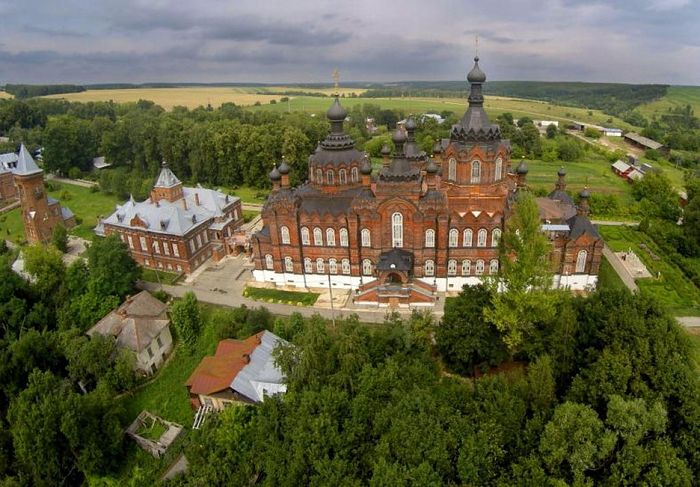 Kazan-St. Ambrose Pustyn, Shamordino
Kazan-St. Ambrose Pustyn, Shamordino
The spiritual atmosphere of the monastery
The situation at my parish is better now—there are more parishioners, and I could stop going to Shamordino, but these trips have become part of my life, and giving them up would be a great spiritual loss for me.
We serve in the Church of St. Ambrose of Optina; the altar is set up on the site of the cell where the great Elder reposed, and it creates a spiritual atmosphere as if he himself were present.
Plus, this monastery has a very serious liturgical life. They celebrate the entire daily cycle of services, lasting nine hours with breaks. You’re not likely to find such serving anywhere else, except on Mt. Athos. From six to nine in the evening—Vespers and Compline, break; from three in the morning—a moleben to St. Ambrose, morning prayers, Midnight Office, Matins, Hours, and Liturgy, which ends at nine in the morning.
An example of the priesthood and of holiness
There are two elders serving in the monastery: the monastery confessor Archimandrite Polycarp and Hieromonk Anthony. They are both examples of the priesthood and examples of holiness for me.
Fr. Polycarp is very humble. He is a well-seasoned archimandrite, he graduated from the theological academy, he served in a Moscow monastery, and this could have left an impression upon him of his own significance, but he is the humblest person I’ve ever met in my life.
Never once has he blessed the meal as the elder priest, but humbly indicates to me that I, the young priest, should do it.
With all his being he tries not to embarrass, not to hurt, not to upset anyone. Even when he has to tell me something about the service or about the typikon, he does it in the most delicate way.
For many years he served all the long services in the monastery completely by himself.
How Fr. Polycarp read my thoughts
I was witness to the fruits of his spiritual podvig. Once, during a service, the thought came to mind that tomorrow I would need a particular liturgical book but I didn’t know where to find it. Fr. Polycarp was standing nearby praying. Suddenly he turned to me and said quietly: “That book is in the altar in such and such a spot.”
From the outside it looked like I had asked him about it, although it was about a service for the next daily cycle and there’s no logical reason to suppose that I would have been thinking about it. He simply read my thoughts.
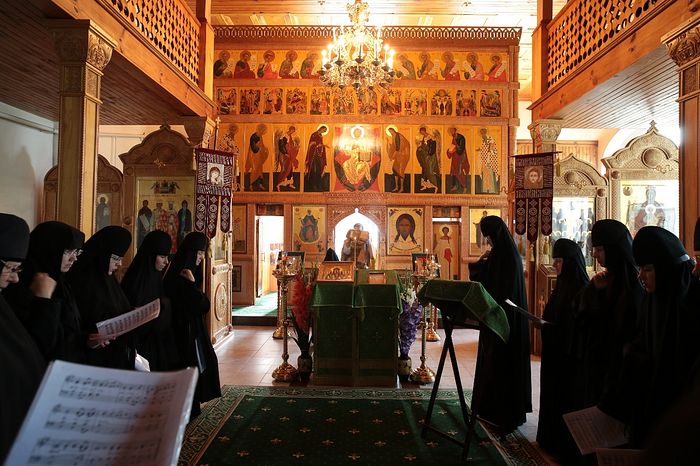 The Church of St. Ambrose in Shamordino
The Church of St. Ambrose in Shamordino
“Your grandpa is a saint”
Another obvious testimony to his podvig is one story that happened before my very eyes. Once, Fr. Polycarp was thinking about the quality of the wine he was using to serve the Liturgy. It’s known that they add ethanol, sugar, and conservatives, and so he decided to make wine himself. Someone told him about a simple natural technology that would be easy to implement in the conditions of his skete.
This is what it looked like: With the help of a juicer, he squeezed the juice from the grapes and then left it alone for a few days. The juice fermented and Fr. Polycarp would remove the foam and pour the resulting wine into containers. Squeeze the juice and remove the foam—an easy task. The wine keeps for a long time.
Once an experienced winemaker came to Shamordino from Crimea and got interested and asked to see the monastery’s wine production. He asked Fr. Polycarp: “How much ethanol do you add to this wonderful wine?”
“None. It’s wine for Liturgy…”
“How much sugar do you put in?”
“Also none.”
“Hmm… And how long do you boil it?”
“I don’t boil it; we don’t have the means to do so in the skete.” (In the skete are bare walls and a gas cylinder.)
“Where do you keep this wine?”
“It’s here in the storeroom.”
“At room temperature?!”
“Yes, of course.”
“And how long have you been storing it?!”
“This here is the freshest; this is from last year; we made this three years ago; this—four…”
The winemaker left the storeroom and said: “Your grandpa is a saint, because such wine does not keep. It simply cannot be.”
Interestingly, Fr. Polycarp once gave me two bottles of his wine on my name’s day. We drank one and the second I put in the refrigerator to treat somebody with it sometime. But within a month the wine had spoiled. But for him the bottles are preserved for many years…
A meeting with Christ
Once we were drinking tea at Fr. Polycarp’s in the skete and Fr. Anthony was telling a story. He had been ordained long ago, in Soviet times, at Danilov Monastery, which the authorities allowed the monks to revive in 1983—the first in the USSR after the long years of persecution against the Church.
A few years later, other ancient monasteries started to be revived; there were no brothers in them, and Fr. Anthony was sent to restore these monasteries: to Solovki, to Valaam, to Optina. They also sent him to serve in distant, nearly deserted parishes. A family priest can’t feed his family there, but a monk can somehow feed himself.
Then he was sent to one distant parish. There they told him that the former priest would travel around all the surrounding villages on feast days and confess and commune the elderly who, because of their health, couldn’t make it to the only church in the area. Fr. Anthony also began to follow this tradition.
One time there was a heavy downpour on the eve of a feast and there was no way to get to one of the villages in his old Volga. Fr. Anthony decided to go as soon as possible, when it dried a little, and to let the old folks know he would commune them during the week, so they would prepare.
He arrived and knocked at the first decrepit cabin and went in: An old woman was sitting by the stove, wearing some kind of threadbare undergarment. She apologized, scurried over to the table, and there was an ironed dress. She left, put on the dress, and came back neat and clean.
“I’m ready, Batiushka!”
“Forgive me, matushka, the road was washed out yesterday and I couldn’t get through… I came to tell you to fast today, and tomorrow don’t eat anything from morning, prepare yourself, and I’ll come to confess and commune you…”
“Yes, yes, Batiusha, we understood and haven’t eaten anything since yesterday. Don’t worry—we won’t eat anything until tomorrow, we’ll wait!”
“No, please, you can eat fasting food; just don’t eat anything tomorrow morning…”
He went to the second, the third house—the same story repeated itself, and he left the village with tears in his eyes, amazed at the reverence with which these old women awaited their meeting with Christ, laying aside all their cares.
In a distant parish
Fr. Anthony said that after this story there was another time where he was amazed by such an attitude. Once, at the beginning of the 1980s, a parish priest came to see him at Danilov Monastery from far away, from a practically deserted parish, where the godless authorities had sent him for his overly active pastoral labors. (Now, by the way, this priest is a rather famous archimandrite).
So this batiushka came to the monastery for a few days to pray and stay in a holy place. He was warmly welcomed. He was so thin and it was clear that his life was hard. The brothers made some fish pelmeni[1] and he was very happy and said: “Wow, you live so well here! After the service I go to my hut, it’s cold… I make some oatmeal, but it gets cold very fast; it becomes like paste…
That is, even a simple monastic meal seemed luxurious to him. The monks began to fatten this thin batiushka, giving him the better pieces. The weekend was coming and he was getting ready to head to his parish. The fathers began to dissuade him: “Stay with us some more! Serve with us, we’ll feed you!”
“No, no, I have the Sunday service, I can’t!”
“Come on! So you don’t serve a service… You don’t have any parishioners anyways…”
“No, no, I have to go. I have two parishioners there at church—one is 80 and the other is almost 90. The one walks two miles to Liturgy, the other seven miles, in winter, usually on skis. How could I let them come and there be no service?! I could face them after that!”
I often recall these stories now. I think about our modern life. We’re now so spiritually relaxed and we don’t understand how important what is happening in the churches of God is for the salvation of our souls. We sit sometimes or we lie there and think: Should I go to church or not? And if we have some household work, then we don’t go.
And these grandmas—elderly, emaciated, sick, who had far fewer opportunities for Communion in Soviet times, in the years of persecution—overcame themselves and knew the value of worship.
Spiritual laws
God cares for everyone. He loves us more than those closest to us. Therefore, the Lord knows that we have needs and concerns that are essentially temporary, based on the concept of eternity. And He understands how important it is for us to live our lives spiritually, so the direction of our being would lead us to Him, not away from Him. After all, our eternal life, which we cannot even imagine, unlike the Lord, depends on how we live our earthy life.
Therefore, God has laid down spiritual laws in our existence that act the same way as physical laws. If we, for example, jump from the third floor, we’ll break our legs or worse, and there’s nothing surprising in this. If our life doesn’t lead us to spiritual growth, then in the same way, something in it will definitely begin to break, in order to correct it. And this, apparently, is the mercy of God. Then sorrow and sicknesses come into our lives.
And, accordingly, the opposite law applies: If someone correctly relates to his sorrow, if it changes his life on the spiritual plane; then the root cause of the sorrow disappears, is eliminated, and with it the sorrow itself recedes.
Before my eyes, people affected by deadly diseases have changed their lives, come to faith, and have risen up from their death beds.
And if someone is a believer, then what—he doesn’t have any sorrows? Of course, they happen, but for spiritual growth. We can recall St. Ambrose—he fell ill at the age of 33, but he became an elder.
Or St. Barsanuphius of Optina… He got pneumonia, was on his deathbed when, at his request, the orderly began to read the Gospel to him, and the patient saw Heaven open and heard a voice from above commanding him to go to Optina Pustyn. His spiritual vision was opened. In the words of Elder Nektary: “From a brilliant soldier, in one night, by the good will of God, he became an elder.”
Spiritual causes are corrected by spiritual actions
I have a friend. He’s an athlete and trainer and also a deeply religious person. His whole conscious life he has unswervingly read the morning and evening prayers and regularly had recourse to the Church Sacraments.
Once, having gone to the south, he relaxed, and his spiritual composure cracked there. One evening he and some friends had a good time at dinner and when it came time for sleep, my friend had no strength for prayer. It was very unusual for him to go to bed without prayer. Falling asleep, he thought: See, I didn’t pray and nothing bad happened, so it’s entirely possible to not pray sometimes, if I’m tired… No big deal!
When he woke up, he felt a strong pain in his back and couldn’t move. They called the ambulance, they took him to the hospital and diagnosed him with a hernia of the cervical spine, about half an inch in size. A hernia a quarter of an inch is already considered reason for an operation, and he had one so large, and in such a dangerous place.
Fearing the unprofessionalism of the local doctors, he headed to Moscow with great difficulty, where they confirmed his diagnosis in a serious capital city clinic and started to prepare for surgery. They warned him that the chances of success were 50/50, but in any case, even in the most successful outcome, he was guaranteed a disability.
In addition, his left hand began to wither and nearly stopped working. As his whole life was connected with movement, it was an even greater tragedy for him than for an ordinary person, and he was in despair.
At the same time, he immediately identified for himself the cause of his sudden misfortune, and it instilled him with hope. Spiritual causes can be corrected by spiritual action: prayer and repentance. He left the hospital himself, took, we can say, a pause, and began to repent and zealously pray, especially asking St. Luke of Crimea for help.
Then the pain suddenly retreated, but a few days later his head hurt (it later turned out it was providential). He was afraid his situation had worsened, so he immediately went to the hospital where they did an MRI. The doctor came out with the picture and asked with surprise: “Can you clarify: What is your complaint and what did you come to us with?”
When the patient started to tell about his diagnosis, given, by the way, in the same clinic, the doctor was even more surprised and said: “You don’t have a hernia! There is a scar on the vertebra you’re talking about, but it seems very old—about five years.”
When my friend showed him the pictures taken two weeks prior, the doctor gathered a consultation that ended with a shrug. One of the clinic’s most authoritative specialists stated the conclusion: “In principle, practice shows that nothing is impossible, but what happened with you is highly unlikely, and unfortunately, we have no hypotheses about it.”
Not even a year has passed and my friend is leading an active life and faithfully prays, and his memories strengthen him in spiritual labor.
For me, this story is a reminder that we have to first take care of the soul. We mustn’t wait until lightning strikes, and if it still strikes, then try to walk an easy and useless path. And if we do walk those paths—when someone hopes for one treatment, it is an attempt to fight with the symptoms, and not with the disease itself.
Responsibility for our loved ones
People often complain to me as a priest: Our parents (husband or wife) don’t believe; we talk to them about faith, but they don’t want to listen to us.
What to say? We have a great responsibility for our loved ones. You can hide your shortcomings from strangers, but not from your loved ones. We stand before them in all our deformity, so to speak. The closer we are to someone, and that person to us, the more unarmed we are before one another in our infirmities.
We want to push our loved ones to a meeting with God, and they don’t want to hear us. It’s because we’re trying to walk the easy path, but not the right path. We try to convince them, and it leads to the opposite result: They begin to resist. But everything depends on how much we all lead a Christian lifestyle. Here are two stories about this.
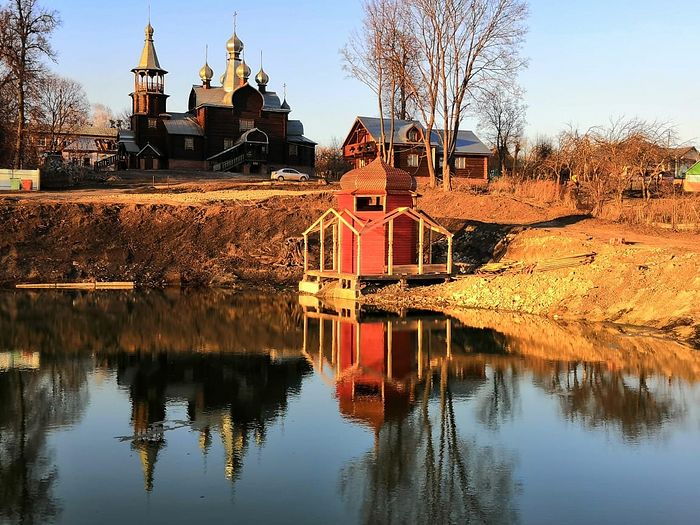 Church of the Dormition of the Most Holy Theotokos in the village of Ozersk (Podborki)
Church of the Dormition of the Most Holy Theotokos in the village of Ozersk (Podborki)
“How wonderful it is to be a believer…”
This summer, a young man stopped by the church one hot day. He had some questions, we started to talk, and he said that he had come to faith not long before and now he’s very happy and has become a completely different person.
There was only one problem: His wife didn’t share his delight and was even against him going to church. I was surprised: “It can’t be!”
And I listed the main Christian qualities that a person leading a Church life tries to acquire: “After all, you’ve probably become more attentive to your wife, become more flexible, more patient—a better family man than before? Who could object to such qualities?”
But he as if didn’t hear me and continued to accuse his wife of failing to understand his new spiritual aspirations.
Our conversation in the chilly church lasted quite a while—until the door opened.
An angry young woman entered the church: “How long can this take?! I’ve been sitting in the car in the blazing sun for a whole hour waiting for you!”
It was the wife of my enthusiastic interlocutor who had been telling me for such a long time about how great it was to be a believer.
Acquire a spirit of peace
Once I was talking with a pilgrim in Shamordino—a deeply religious and churched man. The conversation turned to how he came to faith and he told me the following story.
Earlier, before he was a believer, he had to go to the passport office once—stuffiness, dilapidated walls, tired people in line, tension in the air. The difficult situation was aggravated by the officer who spread her bad mood to everybody. This guy took care of his business, but left with a heavy feeling.
Half a year passed and he had to go to the passport office again. There was the same line, the same dilapidated walls, the same stuffiness and tired people, but there was a completely different employee working—she tried to please everyone, and everyone had a good mood. His turn came; he looked at the officer and realized it was the same woman he had met half a year earlier.
He was greatly astonished and asked her directly how this wonderful change happened. She replied: “You know, I came to the faith, I started going to church, and I try to treat everyone with love…”
Then he wanted to understand how it could happen that someone could change so much, and he decided to go to a church. After that, he started going to services and gradually became how he was when I met him in Shamordino.
His story is striking in that it confirms the words of St. Seraphim of Sarov: “My joy, I pray you, acquire a spirit of peace and thousands of souls around you will be saved.”
And it works not only for our loved ones, but also for complete strangers. One woman changed, and with her help the salvation of someone completely unknown to her began. We don’t need to try to convince our loved ones of anything—we have to change ourselves.
Help us in this, O Lord!

